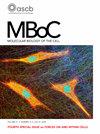Big1 is a newly identified autophagy regulator that is critical for a fully functional V-ATPase.
IF 3.1
3区 生物学
Q3 CELL BIOLOGY
引用次数: 0
Abstract
The vacuolar H+-translocating ATPase (V-ATPase) is the major proton pump for intra-organellar acidification. Therefore, the integrity of the V-ATPase is closely associated with cellular homeostasis, and mutations in genes encoding V-ATPase components and assembly factors have been reported in certain types of diseases. For instance, the recurrent mutations of ATP6AP1, a gene encoding a V-ATPase accessory protein, have been associated with cancers and immunodeficiency. With the aim of studying V-ATPase-related mutations using the yeast model system, we report that Big1 is another homolog of ATP6AP1 in yeast cells, and we characterize the role of Big1 in maintaining a fully functional V-ATPase. In addition to its role in acidifying the vacuole or lysosome, our data support the concept that the V-ATPase may function as part of a signaling pathway to regulate macroautophagy/autophagy through a mechanism that is independent from Tor/MTOR.Big1 是一种新发现的自噬调节因子,对于 V-ATP 酶的全面发挥作用至关重要。
液泡H+转运ATP酶(V-ATP酶)是细胞器内酸化的主要质子泵。因此,V-ATPase 的完整性与细胞稳态密切相关,有报道称编码 V-ATPase 组成部分和装配因子的基因突变会导致某些类型的疾病。例如,编码 V-ATPase 辅助蛋白的基因 ATP6AP1 的复发性突变与癌症和免疫缺陷有关。为了利用酵母模型系统研究与 V-ATPase 相关的突变,我们报告了 Big1 是 ATP6AP1 在酵母细胞中的另一个同源物,并描述了 Big1 在维持 V-ATPase 全面功能方面的作用。除了在酸化液泡或溶酶体中的作用外,我们的数据还支持这样一种观点,即 V-ATP 酶可能作为信号通路的一部分,通过一种独立于 Tor/MTOR 的机制来调节大自噬/自噬。
本文章由计算机程序翻译,如有差异,请以英文原文为准。
求助全文
约1分钟内获得全文
求助全文
来源期刊

Molecular Biology of the Cell
生物-细胞生物学
CiteScore
6.00
自引率
6.10%
发文量
402
审稿时长
2 months
期刊介绍:
MBoC publishes research articles that present conceptual advances of broad interest and significance within all areas of cell, molecular, and developmental biology. We welcome manuscripts that describe advances with applications across topics including but not limited to: cell growth and division; nuclear and cytoskeletal processes; membrane trafficking and autophagy; organelle biology; quantitative cell biology; physical cell biology and mechanobiology; cell signaling; stem cell biology and development; cancer biology; cellular immunology and microbial pathogenesis; cellular neurobiology; prokaryotic cell biology; and cell biology of disease.
 求助内容:
求助内容: 应助结果提醒方式:
应助结果提醒方式:


